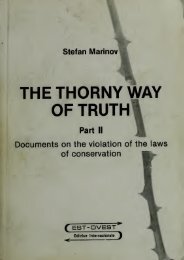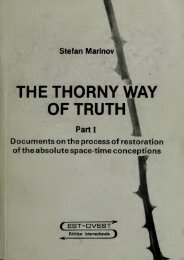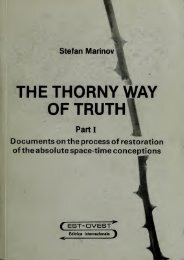- Page 3 and 4:
Stefan MarinovTHE THORNY WAYOF TRUT
- Page 5 and 6:
EOM TEBE, n03T, rOFDC ^H -OCTAJibHO
- Page 7 and 8:
- 3nEPflHCJlOBHE ,^„ ,,(FARTVIORD
- Page 9 and 10:
T/iX6 dAowlng, ca wzit ca alZ dfiam
- Page 11 and 12:
Because aware of all of this, Dr. M
- Page 13 and 14:
i,^ t^^^l.^.^4A:% oeiM9^^
- Page 15 and 16:
AKaACMOK B. H. rO:ibflAIICKIinMiic
- Page 17 and 18: .J|r«.j;i^^SCIENTIFICPAPERS
- Page 19 and 20: ^- 15 - MarinovLet us calculate fir
- Page 21 and 22: - 17 - I Man' noVMaking calculation
- Page 23 and 24: _ 19 - MarinovI did such an experim
- Page 25 and 26: - 21 - .,^ MarinovAs the power incr
- Page 27 and 28: - 23 - f MarinovVREFERENCES1. S. Ma
- Page 29 and 30: Z5 -Fig. 3ll
- Page 31 and 32: - 27 - Marinovtheory and Gras'smann
- Page 33 and 34: - 29 - MarinovThis assertion of Gra
- Page 35 and 36: ,.Then/ w ."- 31 - Mari'novB = rotA
- Page 37 and 38: - 33 - MarinovFig. 1
- Page 39 and 40: - 35 -#•\- '
- Page 41 and 42: jI 37Uwolule and RelaUve Nwfton-Lor
- Page 44 and 45: - 40 -1845. ANNALEN JVo. 1DER PHYSI
- Page 46 and 47: ^a.die Einwirkungchics gesclilossen
- Page 48 and 49: - 44 -4) Ich gelic (lalicr, ohiic z
- Page 50 and 51: 46fiir ciiieii Winkclshom cbcii so
- Page 52 and 53: 48 -Siroinclcraentczwei Glicdcnidic
- Page 54 and 55: Zu- 50 -iiientheile cbcii so den Wi
- Page 56 and 57: - 52 -^^ben Ebenc aiigcIiOrcii. F(i
- Page 58 and 59: eingcschalteten54sonst ebcii A i"h1
- Page 60 and 61: «56die Wirkiing a«f ^ "^^'^ ^^'*
- Page 62 and 63: 58Na A ^ BSi^N
- Page 64 and 65: - 60 -DE L'ACADEMIE DE PARIS, vol.
- Page 66 and 67: .- 62 - ^0 -i ,according to the vie
- Page 70 and 71: -66 -considers the specific current
- Page 72 and 73: 68What results from equation (2) is
- Page 74 and 75: - ?oc^Then,dx dy dzarc the componen
- Page 76 and 77: - 72 -into(9) ^•^.==2j2j"rv^'dF"^
- Page 78 and 79: s = -n -
- Page 80 and 81: - 76 -Wc will want to continue to t
- Page 82 and 83: - 78 -VV?tr,(6)^ ^ ^' J^r 2 zi' £'
- Page 84 and 85: - 80,(1) ,(1)•>y, di ^ 'by dt ^y
- Page 86 and 87: Thus, Weber's hypothesis, in the ca
- Page 88 and 89: and function g here is dependent on
- Page 90 and 91: - 86 -when the summation is extende
- Page 92 and 93: The Equivalence of Ampere's Electro
- Page 94 and 95: - 90 -Equivalence of Ampere* s Elec
- Page 96 and 97: - 92 -to the flow of current was va
- Page 98 and 99: • w-AMPERE'S CARDINAL LAW IN EXPL
- Page 100 and 101: ,forcesLorentz's Formula (6) implie
- Page 102 and 103: - 98 -similar coils, supplied with
- Page 104 and 105: 100 -product of q and *, but for th
- Page 106 and 107: - 102Fig.1The force per unit lest c
- Page 108 and 109: - IMHowever, if we follow the Gauss
- Page 110 and 111: - 106Fr.-IQ1Q2I4nc^ru. X (tr)< tf)2
- Page 112 and 113: 1C8 -However, if there are Ni and N
- Page 114 and 115: Herring, Graneau. Pappas, Phipps an
- Page 116 and 117: determine whether these qualitative
- Page 118 and 119:
- 114 -MARINOVS COMMENTS ON THE PRE
- Page 120 and 121:
116vity w = V -u, wherew is the vel
- Page 122 and 123:
- use-The following paper was prese
- Page 124 and 125:
- 120 -debate. I have chosen to pos
- Page 126 and 127:
-It- 122 -route this energy takes,
- Page 128 and 129:
This- 124 -Invariance with translat
- Page 130 and 131:
- 126 -how currents produced by hea
- Page 132 and 133:
- 128 -classical relativlstlc expre
- Page 134 and 135:
- 130 -Without wishing to criticize
- Page 136 and 137:
- 132 -The conclusion to be drawn f
- Page 138 and 139:
- 134 -2. WHAT WAS WRONG WITH THE I
- Page 140 and 141:
136 -My expression for the magnetic
- Page 142 and 143:
- 138done) any efforts so that the
- Page 144 and 145:
•Such.be some group beliefs held
- Page 146 and 147:
tapping, and the Great I Am), it is
- Page 148 and 149:
144SEAGREEN (Bologna), Nr. 5/6, Inv
- Page 150 and 151:
- 146rhadata.Secondo le cosIk) pens
- Page 152 and 153:
148R. Vediamo... ancora la velocity
- Page 154 and 155:
150Stefan marinovdilatazionecinemat
- Page 156 and 157:
- 152 -osservatore che sa che il pr
- Page 158 and 159:
- 154 -stessa iTtezza cm h suto pos
- Page 160 and 161:
- 156 -Considehamo dunque una giost
- Page 162 and 163:
j158THE PLASMA GENERATOR OF FREE EN
- Page 164 and 165:
160 -the case with all known to hum
- Page 166 and 167:
162of us have seen at storms. The b
- Page 168 and 169:
- 164 -generator "Nigotron". During
- Page 170 and 171:
- 166 -only the rotational pump as
- Page 172 and 173:
- 168 -power surely is bigger than
- Page 174:
- 170 -rnivwsiUI J. E. Purky&i Bnw.
- Page 177 and 178:
*m«»l'^173132 V. Fabsky und J. Ja
- Page 179 and 180:
- 175 -134V. Fabskt and J. Jxti6A10
- Page 181 and 182:
IVacuum energy:iabreakthrough177 -P
- Page 183 and 184:
179beta-decay by 6.0%. This is only
- Page 185 and 186:
1816) Samokhin writes: "It is gener
- Page 187 and 188:
183 -defined, however, by a new act
- Page 189 and 190:
185 -constructive units of the rest
- Page 191 and 192:
187 -It would be fine, but quite st
- Page 193 and 194:
'^'- 189REFERENCES1. Kiyoshi Kato,
- Page 195 and 196:
191 - TABLE 4-18R|^ (in 10 m) for s
- Page 197 and 198:
I193CORRESPONDENCE
- Page 199 and 200:
195CZECHOSLOVAK JOURNAL OF PHYSICSR
- Page 201 and 202:
197 -(But S in equ.
- Page 203 and 204:
199INDIAN JOURNAL OF PHYSICSINDIAN
- Page 205 and 206:
201CZECHOSLOVAK JOURNAL OF PHYSICSA
- Page 207 and 208:
- 203i:^.^. ? ;.surements also on o
- Page 209 and 210:
- 205ĀCTA PHYSICA SLOVACA(see TWT-
- Page 211 and 212:
'•Dr.> JJ .'-'•' :'' ''Petr Bec
- Page 213 and 214:
209 - ACTA PHYSICS SLOVACAAUTHOR'S
- Page 215 and 216:
I211The derivation of the Lorentz f
- Page 217 and 218:
STEFAN ^:''^AB1N0VA-gOlOOR^Z- AUSTR
- Page 219 and 220:
215STEFAN MARBVOVMorellenfeldgasse
- Page 221 and 222:
217PHYSICS LETTERS AROr ESSOR J.R V
- Page 223 and 224:
219INDIAN JOURNAL OF PHYSICSINDIAN
- Page 225 and 226:
1- 221 -PHYSICS LETTERS AOFESSOR V.
- Page 227 and 228:
.- 223 -A-8010 GKf>.:^ — AUSTRIAT
- Page 229 and 230:
2252. The referee knows (I presume)
- Page 231 and 232:
J. P. WESLEY, Ph.D. Physicist- 227
- Page 233 and 234:
229ANNALS OF PHYSICSEditor-in-Chief
- Page 235 and 236:
^WORLD- 231SCIENTIFIC PUBLISHING CO
- Page 237 and 238:
233Editor:PHYSICS ESSRVSAN INTERNAT
- Page 239 and 240:
235 -Mord'cnfoHc-.r.'^e 16 25 April
- Page 241 and 242:
- 237DEM CHRISTLICHEN KOM^UNISMUS E
- Page 243 and 244:
- 239 -MEINE VORSCHLAGE ZU DEM 27.P
- Page 245 and 246:
241 -'HYSICS LETTERS AHoping to rec
- Page 247 and 248:
does not depend on the radius of cu
- Page 249 and 250:
.dit orial not e. See Marinov's Sin
- Page 251 and 252:
[ needftf'**!^One must especially E
- Page 253 and 254:
^pere: d^d^d^' = (R/R^) C -2J.J' .
- Page 255 and 256:
251Zentralkomitee derKommunistische
- Page 257 and 258:
- 253 -International scientific, te
- Page 259 and 260:
255 -Moreilenfeldgasse 16A-3010 GRA
- Page 261 and 262:
- 257 -Sre^NMAEINOV p,of. I. Kovacs
- Page 263 and 264:
,- 259 --7 2legs) must be \1q = 4tt
- Page 265 and 266:
STEFAN MARINOV- 261 -'acta'^physJca
- Page 267 and 268:
.STEFAN MARINOV,- 263 -Prof. Robert
- Page 269 and 270:
265PHYSICS EssnvsEditor:E. Panarell
- Page 271 and 272:
-267-STEFAN MARINOV Dr. Peter Newma
- Page 273 and 274:
.269 -over a sinall volume where J,
- Page 275 and 276:
- 271-2 20 2 2f = 4tt/c = 4Tr/9xlO
- Page 277 and 278:
: shall: wish- 273 -STEFAN MARINOV
- Page 279 and 280:
,275annnor maphhoba k efo yawio amc
- Page 281 and 282:
''I uber27 7-; Tran, nurwenige Kilo
- Page 283 and 284:
- 279 -VIS 900612"address for proof
- Page 285 and 286:
Morellcnfcldgasse 16A-8010 GRAZ - A
- Page 287 and 288:
.283GALILEAN ELECTRODYNAMICSBox 251
- Page 289 and 290:
P. T. PAPPAS- 285 -Prof, of Mathema
- Page 291 and 292:
;- FAN'287itefan Marinov's seasonal
- Page 293 and 294:
- 289 - 1 LETTER TO THE EDITOR OF "
- Page 295 and 296:
- 291 -STEFAN MARINOV Prof. p. T. P
- Page 297 and 298:
STEFAN MARINOVMorellenfeldgasse 16A
- Page 299 and 300:
- 295 -PHYSICAL SOCIETY OF JAPANKik
- Page 301 and 302:
:- 297 -STEFAT^ MARINOV Dr. Petr Be
- Page 303 and 304:
STEFAN MAPJNOVMorcllcnfeldgasse 16A
- Page 305 and 306:
- 301 -SIEFAN MARINOVp ^ i p v•Mo
- Page 307 and 308:
'STFFAN,- 303 -MAPIlSinV ^^' Taizo
- Page 309 and 310:
- 305ANNALS OF PHYSICSEditor-in-Chi
- Page 311 and 312:
- 307 -International scientific, te
- Page 313 and 314:
- 309&IEFAN MAMNOV ^ ^- ^ ,^^^Dr. S
- Page 315 and 316:
MarinovSir— I wish to state that
- Page 317 and 318:
STEFAN MAPINOV- 313 -^ iMorellenfel
- Page 319 and 320:
315 -BEFORX OH TBB PAPKR ERXIXUSDPH
- Page 321 and 322:
I,The- 317 -Bohm-Aharonov effect ar
- Page 323 and 324:
1Dr. P. BeckmannSTEFAN MARINOV319 -
- Page 325 and 326:
- 321 -CONTENTS:Preface (nepAHcnoBH
- Page 328:
The eighth part of the collection o








